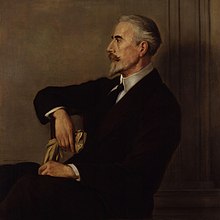Henry Wickham Steed
Henry Wickham Steed (born October 10, 1871 in Long Melford , Suffolk , England , † January 13, 1956 in Wootton , West Oxfordshire ) was a British journalist and historian .
Life
Steed began his career with a study visit to Germany, where he learned the language, worked as a correspondent for the Times in Paris from 1896 , came to Rome as a correspondent in 1897 and to Vienna around 1902, where he stayed until 1914 and with Josef Redlich and Hermann Bahr was friends.
In 1913 he wrote a work on Austria-Hungary , which he finished shortly before the outbreak of war. In the following years he got to know various emigrants, such as Edvard Beneš , Tomáš Masaryk and Roman Dmowski , and came to the conclusion that Austria-Hungary - in order to achieve a quick end to the First World War - should be dissolved and its peoples should become independent .
From 1914 he was the head of the foreign policy department at the Times in London. As a personal acquaintance of Theodor Herzl , he promoted the Zionist cause and in 1917/18 he used the journalistic weight of the "Times" to promote the Balfour Declaration . At that time he headed the Austria-Hungary department of the Directorate for Propaganda in Enemy Countries of the Ministry of Information in Crewe House under Alfred Harmsworth .
On February 24, 1918, Harmsworth sent a memorandum from Steed to Secretary of State Balfour . Since the attempt at a separate peace has failed, it states that a policy must be pushed through which should bring about the destruction of the multiethnic state through propaganda activities by the exile organizations. Balfour agreed to this new policy, but wanted to continue trying to resolve Emperor Karl of Germany through a separate peace . Official politics then encouraged the separatists, but for the time being without promising independence.
Steed and his most important colleague Robert William Seton-Watson presented the monarchy as a vassal and possession of Germany. The Habsburg dynasty was unscrupulous , one had to support the peoples fighting for freedom, with a separate peace the peoples of Central Europe would be doomed to slavery . Steed and his propaganda department made the Slavic independence movements of the monarchy popular in Great Britain and put pressure on the Foreign Office with the aim of recognizing the self-determination rights of the Austro-Hungarian peoples, not within the monarchy, but through its dissolution. Even in August 1918, Balfour was the only one in the War Cabinet who was absolutely committed to the destruction of the multi-ethnic state.
After the war, Steed ran the Times as editor-in-chief from 1919 to 1922. He warned early on of the outbreak of World War II about Hitler and his ambitions. Between 1937 and 1947, Steed taught Eastern European history at King's College, London . He was also employed by the BBC Overseas Service (1937-47), which at the time was under the Ministry of Information .
Works
- 1913: The Habsburg Monarchy
- 1914: A Short History of Austria-Hungary and Poland
- 1938: The Press
- 1939: Our War Aims
literature
- Andre Liebich: The antisemitism of Henry Wickham Steed. In: Patterns of Prejudice. Vol. 46 (2012), H. 2, pp. 180-208, doi: 10.1080 / 0031322X.2012.672226 ( PDF ).
Web links
- Newspaper article about Henry Wickham Steed in the 20th century press kit of the ZBW - Leibniz Information Center for Economics .
supporting documents
- ↑ Hermann Bahr: Love of the Living. Diaries 1921/23. Borgmeyer, Hildesheim 1925, Vol. 2, pp. 117-122.
- ^ Harry Hanak: Great Britain and Austria-Hungary during the First World War. A Study in the Formation of Public Opinion . London / New York / Toronto 1962. pp. 277 f.
- ↑ Harry Hanak: The attitude of Great Britain and the United States to Austria (-Hungary) . In: Adam Wandruszka, Walter Urbanitsch (ed.): The Habsburg Monarchy 1848–1918 . Volume 6: The Habsburg Monarchy in the System of International Relations . 2nd volume, Vienna 1993, ISBN 3-7001-2084-2 , pp. 539-585; here: p. 581.
- ^ Arthur J. May: The Passing of the Habsburg Monarchy 1914–1918 . Philadelphia 1967. Vol. 2, pp. 533 f.
- ^ John W. Mason: The Dissolution of the Austro-Hungarian Empire, 1867-1918 . London / New York 1985, ISBN 0-582-35393-9 . P. 75.
- ^ Harry Hanak: The Government, the Foreign Office and Austria-Hungary, 1914-1918 . In: The Slavonic and East European Review . 47 (1969), pp. 161-197, here: p. 196.
- ^ Giorgio Petracchi: Dietro le quinte del convengo Volta sull'Europa. Un piano per sovvertire l'Europa centro-orientale . In: Maddalena Guiotto, Wolfgang Wohnout (ed.): Italy and Austria in Central Europe in the interwar period / Italia e Austria nella Mitteleuropa tra le due guerre mondiali . Böhlau, Vienna 2018, ISBN 978-3-205-20269-1 , p. 88-90 .
| personal data | |
|---|---|
| SURNAME | Steed, Henry Wickham |
| BRIEF DESCRIPTION | British journalist and historian |
| DATE OF BIRTH | October 10, 1871 |
| PLACE OF BIRTH | Long Melford , Suffolk , England |
| DATE OF DEATH | January 13, 1956 |
| Place of death | Wootton , West Oxfordshire |
